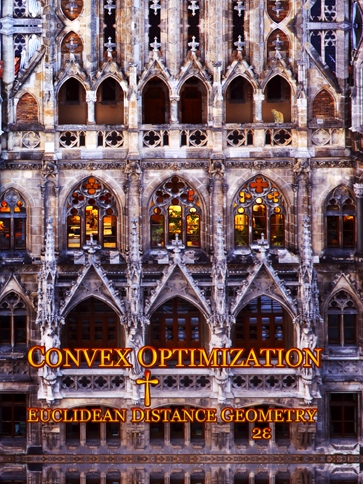Convex Optimization and Euclidean Distance Geometry 2e

简介:
通俗地说,优化的数学科学是研究如何在面对冲突的要求和需求时做出正确选择的研究。从历史上看,优化是一种相对较新的智慧,可以代表真实事物的平衡。限定符con凸的意思是: 当找到最优解时,则保证它是最佳解; 没有更好的选择。
任何凸优化问题都有几何解释。如果给定的优化问题可以转换为凸等价,则可以获得此解释性收益。这是一个强大的吸引力: 可视化优化问题的几何形状的能力。相反,几何和图论的最新进展将凸优化保留在其证明的核心中。[439] [340]
这本书是关于凸优化,凸几何 (特别注意距离几何),以及可以放松或转化为凸性的非凸,组合和几何问题。新应用程序的虚拟泛滥随之而来的是顿悟,许多假定为非凸的问题可以如此转换: [11] [12] [35,?4.3,第316页-322] [61] [97] [163] [166] [294] [318] [326] [385] [386] [436] [439] 例如,sigma delta模数 (A/D) 音频转换器抗混叠 (图1)。
英文简介:
In layman’s terms, the mathematical science of Optimization is a study of how to make good choices when confronted with conflicting requirements and demands. Optimization is a relatively new wisdom, historically, that can represent balance of real things. The qualifier convex means: when an optimal solution is found, then it is guaranteed to be a best solution; there is no better choice.
Any convex optimization problem has geometric interpretation. If a given optimization problem can be transformed to a convex equivalent, then this interpretive benefit is acquired. That is a powerful attraction: the ability to visualize geometry of an optimization problem. Conversely, recent advances in geometry and in graph theory hold convex optimization within their proofs’ core. [439] [340]
This book is about convex optimization, convex geometry (with particular attention to distance geometry), and nonconvex, combinatorial, and geometrical problems that can be relaxed or transformed into convexity. A virtual flood of new applications follows by epiphany that many problems, presumed nonconvex, can be so transformed: [11] [12] [35, ? 4.3, p.316-322] [61] [97] [163] [166] [294] [318] [326] [385] [386] [436] [439] e.g, sigma delta analog-to-digital (A/D) audio converter antialiasing (Figure 1).
- 书名
- Convex Optimization and Euclidean Distance Geometry 2e
- 译名
- 凸优化和欧氏距离几何 2e
- 语言
- 英语
- 年份
- 2005
- 页数
- 704页
- 大小
- 35.38 MB
- 标签
- 几何
- 数学
- 下载
 Convex Optimization and Euclidean Distance Geometry 2e.pdf
Convex Optimization and Euclidean Distance Geometry 2e.pdf- 密码
- 65536
最后更新:2025-04-12 23:58:10
←Linked Open Data - Creating Knowledge Out of Interlinked Data: Results of the LOD2 Project
→Combinatorial Optimization: Exact and Approximate Algorithms